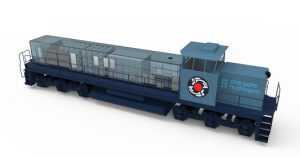 The Estonian company Operail and OÜ Stargate Rail signed a letter of intent to convert diesel-electric locomotives to zero-emission fuel cell electric locomotives.
The Estonian company Operail and OÜ Stargate Rail signed a letter of intent to convert diesel-electric locomotives to zero-emission fuel cell electric locomotives.
As part of the retrofitting project, the diesel gensets that power the locomotives will be replaced by a zero-emission powertrain consisting of polymer-electrolyte-membrane fuel cells and lithium-ion batteries.
The partnership will be implemented into two phases. Initially, a prototype of a fuel cell electric locomotive will be constructed by the end of 2022. In the second phase of the project, the parties intend to convert additional 40 locomotives to fuel cell power.
“There is no doubt that we need innovative solutions to enable the wider use of alternative fuels such as green hydrogen. We are keen on exploring, together with Shift2Rail and Fuel Cells Hydrogen Joint Undertakings, how fuel cell and hydrogen can be integrated into rail operations and how to turn ideas into actual projects and applications,” Henrik Hololei, the Director General for Mobility and Transport at the European Commission said.
After the conversion, the locomotives will be used to perform shunting activities.
Each converted locomotive will save 370 tonnes of CO2 emissions per year, equivalent to the annual emissions of 80 average passenger cars.
“Retrofitting ageing diesel locomotives to zero-carbon alternatives is already an economically sustainable solution and will be even more so in the future. Retrofitting also allows the reuse of existing diesel-electric locomotives that would otherwise end up as stranded assets once they no longer meet future emission standards,” Rainer Küngas, Chief Technology Officer at Stargate Rail, said.
OÜ Stargate Hydrogen is a privately owned company developing turn-key green hydrogen solutions in Estonia. Stargate Rail’s core business is the conversion of diesel-electric locomotives to fuel cell alternatives. The company is aiming to become a global leader in hydrogen solutions and its activities are focused on developing the next generation electrolyser and fuel cell solutions for locomotives.
Estonia’s 2030 plan is to develop a fully sustainable rail transport. Within the next ten years 14% of the transport sector should use renewable energy. This will be achieved by the electrification programme for which in 2020 EVR signed an electrification design contract for 500 km.
Estonia is also interested to introduce innovative and clean vehicles where electrification is not feasible. Currently, 16% (225 km of lines) of the 1,214 km rail network is electrified.
Share on:



